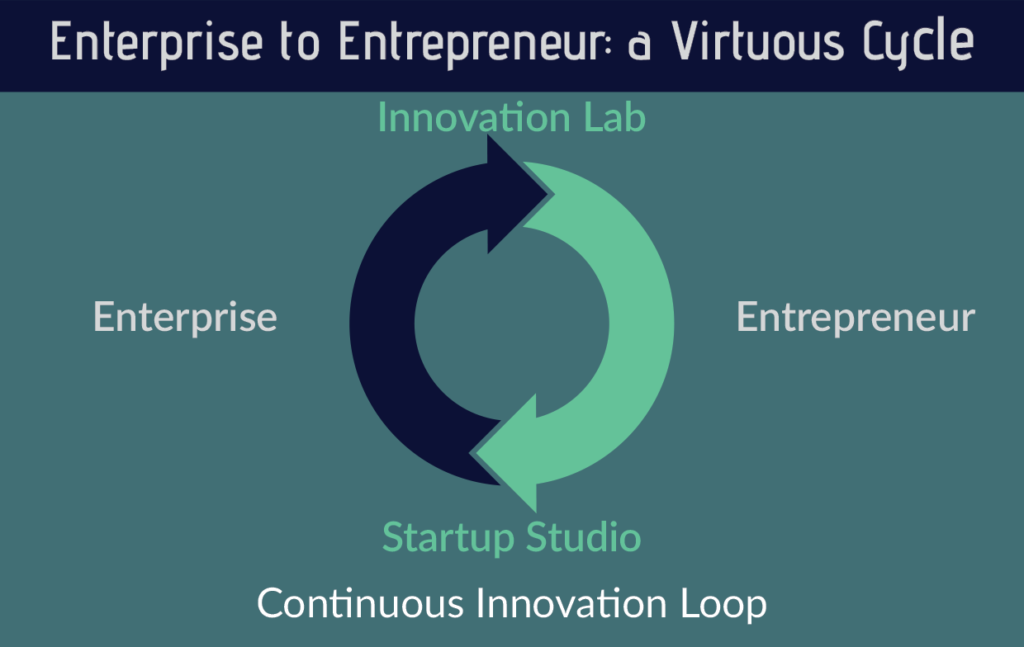CB Insights recently listed the many reasons (top 20) why startups fail. While we’re all about teachable moments to avoid more failure, we think the startup studio model is one sure-fire way to minimize the risks associated with new startup ventures. Verdant AI drives innovation in Enterprise-Grade Artificial Intelligence by being the interface between corporate innovators and entrepreneurs.
Continuous Loop of Innovation
Verdant AI has created an interface between corporate innovators and entrepreneurs that forms a continuous loop of AI innovation. Our corporate partners come to us with a unique set of problems and usually massive amounts of data that our team then sets out to resolve through new product development. These large scale endeavors generate new IP and inspire new ideas that feed our startup studio, where these ideas are spun out into new companies or incorporated back into the enterprise.

Enterprise partners benefit from a cross-disciplinary team that has honed its ability to spot market opportunities and create breakthrough technologies with extensive experience across verticals, startups and corporate enterprises.
Startup entrepreneurs benefit from a disciplined approach to market entry that follows a rigorous stage methodology and a path to acquisition nurtured through trusted relationships, where new AI-driven technology products are built with enterprise market need in mind.
Studio companies are attractive for investors and strategic partners alike. Since they are built with enterprise needs in mind, they accelerate time to market, making them higher acquisition targets that come in at a lower cost than hiring 200 data scientists and throwing spaghetti at the wall.
For Verdant AI, our specialization in AI benefits from data at scale, meaning that our team can leverage these economies of data in ways that de-risk the startup ventures we create. Let’s break down the top 3 reasons why the studio model de-risks new venture and accelerates the road to success.
1. Validation of Market Need
The startup studio model is an excellent vehicle to validate market demand before a product makes it to market. Through a stage-gate methodology, its team will run the product through a variety of tests before it can move to the next phase. In the case of market validation, the startup studio will generally have identified corporate customers, secured interest and run a variety of pilots to ensure graduation to the next stage in the process.

2. Cash is a non-issue for equity invested founders
While most VC-funded startups have to worry about run rates and securing their next round of VC funding to keep the lights on, founders that are brought in via a studio model such as Verdant’s are often established enough to take a small pay to equity ratio. The lack of VC pressure to hit revenue milestones also makes it less of an issue for startups born of the studio model, given they can take time to get the product right, find market fit and generate revenues.
3. Team is hand-selected for problem, market, and scope
While many startups are made up of founders who happen to be in the same place and time (grad school or work teammates), Startup Studios begin with a solution to a problem and then select the right entrepreneurial team to take it to market. Experience and networks are differentiators that create huge competitive advantage when it comes to finding the right fit for specific operational functions such as Data Scientists, Marketers with deep SaaS expertise or Sales execs with expansive medical networks. Bringing the right team together with the experience, knowledge, and connections to bring a product to market is where the startup studio excels and thus can rapidly validate market assumptions and accelerate time to launch.
Verdant AI takes things a step further to minimize startup risk
The Verdant Innovation Lab partners with enterprises that are looking to unlock the value of their data through new technology and product creation. Through these relationships, Verdant can create a direct product pipeline of innovation from Entrepreneur to Enterprise, where new technologies and innovations can be spun off into new business lines and companies with confirmed customer pilots and validated product-market fit.


